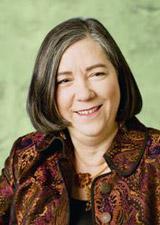Efraim Racker

Protein Folding Mechanisms as Capacitors for Evolutionary Change
About the speaker

Susan L. Lindquist
Director, The Whitehead Institute for Biomedical Research, MIT
Susan Lee Lindquist received her Ph.D. in Biology from Harvard University and her B.A. from the University of Illinois, then served as a postdoctoral fellow at the University of Chicago where she rose from Assistant Professor to full Professor of Molecular Genetics and Cell Biology (1976 to 2001) and was also Howard Hughes Investigator (1988 to 2001). She joined the Massachusetts Institute of Technology this year as Professor of Biology and Director of the Whitehead Institute of Biomedical Research.
Dr. Lindquist is widely known for her exceptional research on the biochemical mechanism and biological consequences (including human disease) of protein conformational changes. Her numerous publications which frequently appear in Science, the Proceedings of the National Academy of Sciences, and Nature, are both rigorous and comprehensible to a broad audience. Her science has focused on three aspects of protein folding. One is the quality control system involving proteins known as “chaperones” that are dedicated to helping other proteins fold and assume their proper functions. Like human chaperones, protein chaperones prevent highly interactive, immature forms from making bad connections and wrest them apart when they do. This is particularly important when certain types of misfolded proteins influence others to do the same. These renegade proteins, “prions” and “amyloids,” are a second focus of Lindquist’s research. They have a dazzling variety of effects: some cause ghastly neurodegenerative human diseases, while others endow cells with new functions. The third focus is “shape changer” proteins, also called signal transducers. These maintain their general shapes all the time, but routinely switch a small region, folding and refolding, to drive growth and development. The chaperone Hsp90 stabilizes shape changer proteins that regulate growth. The genetic changes in these proteins are often too small to affect the organism on their own. But under stress, the interactions between Hsp90 and these proteins are disrupted, revealing hidden genetic changes that may not have appeared otherwise. Because some abnormalities might provide a survival advantage, the process might be an important force or “capacitor” in driving evolution.
Lindquist’s honors are numerous. It is of special relevance to note that she gave the Keith Porter Lecture at the 2001 American Society for Cell Biology annual meeting and was a keynote speaker at the 1998 ASCB meeting. She has been elected to the National Academy of Sciences (1997) and American Academy of Arts and Sciences (1998), and was awarded the Novartis Drew Award in Biomedical Research (2000).